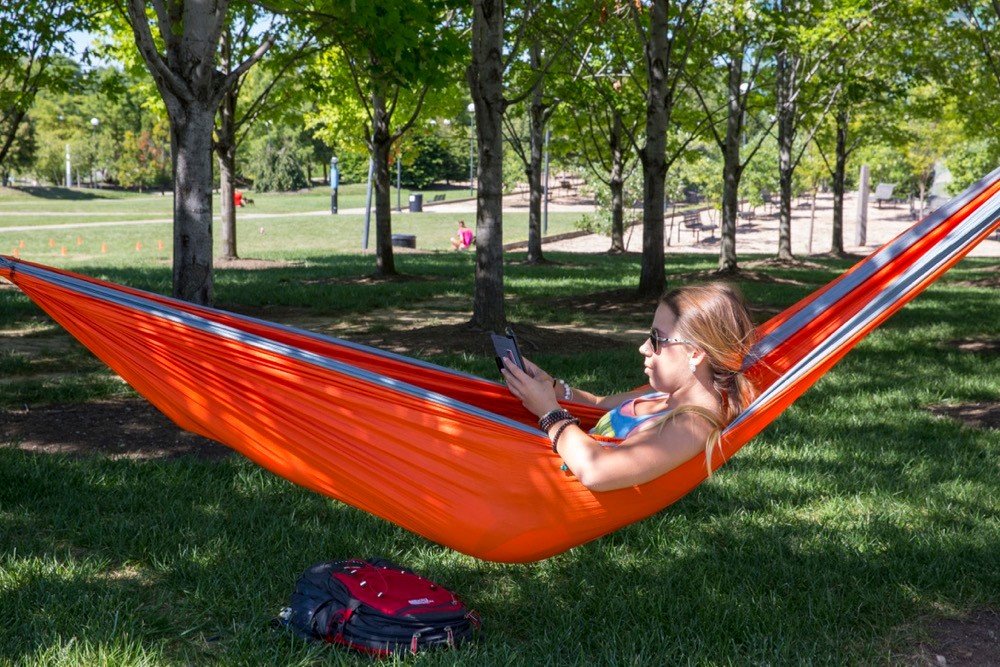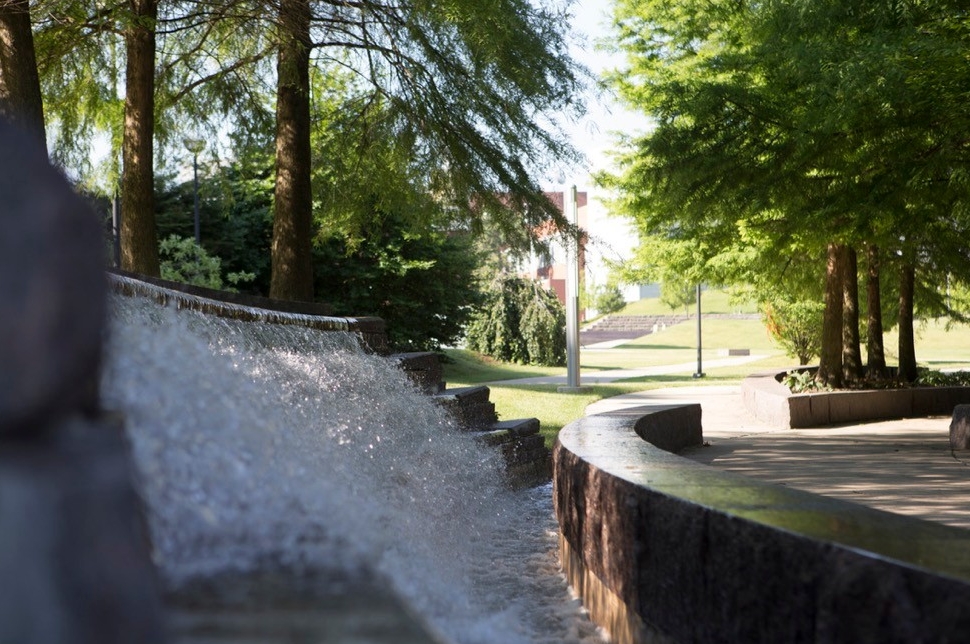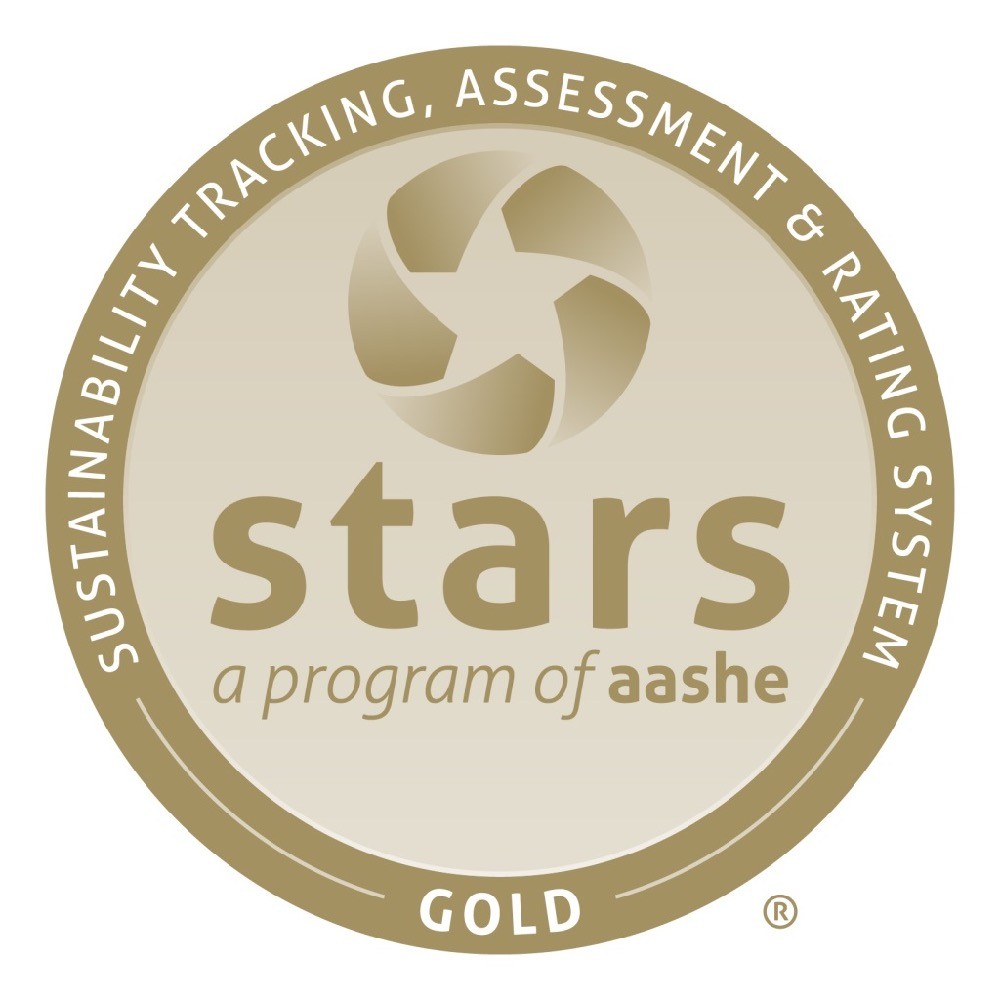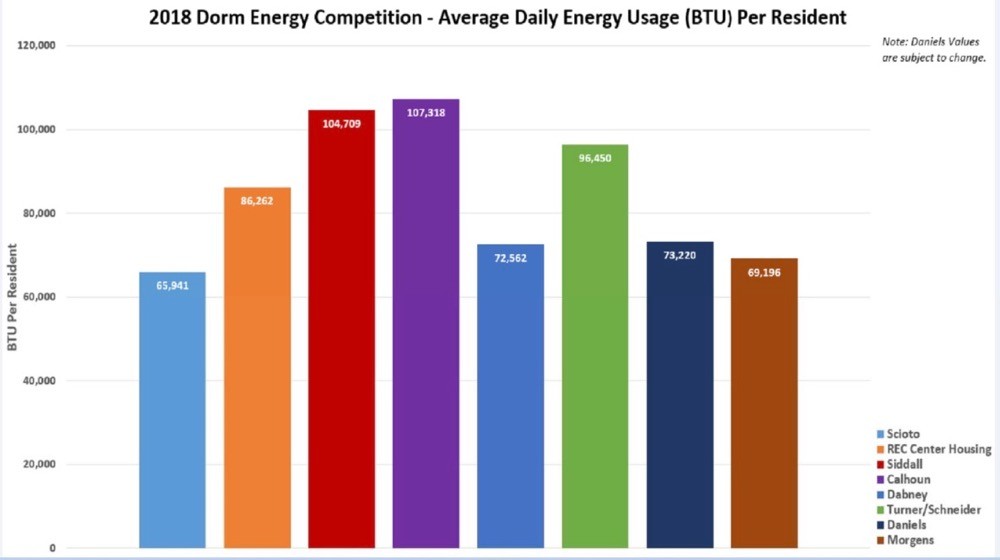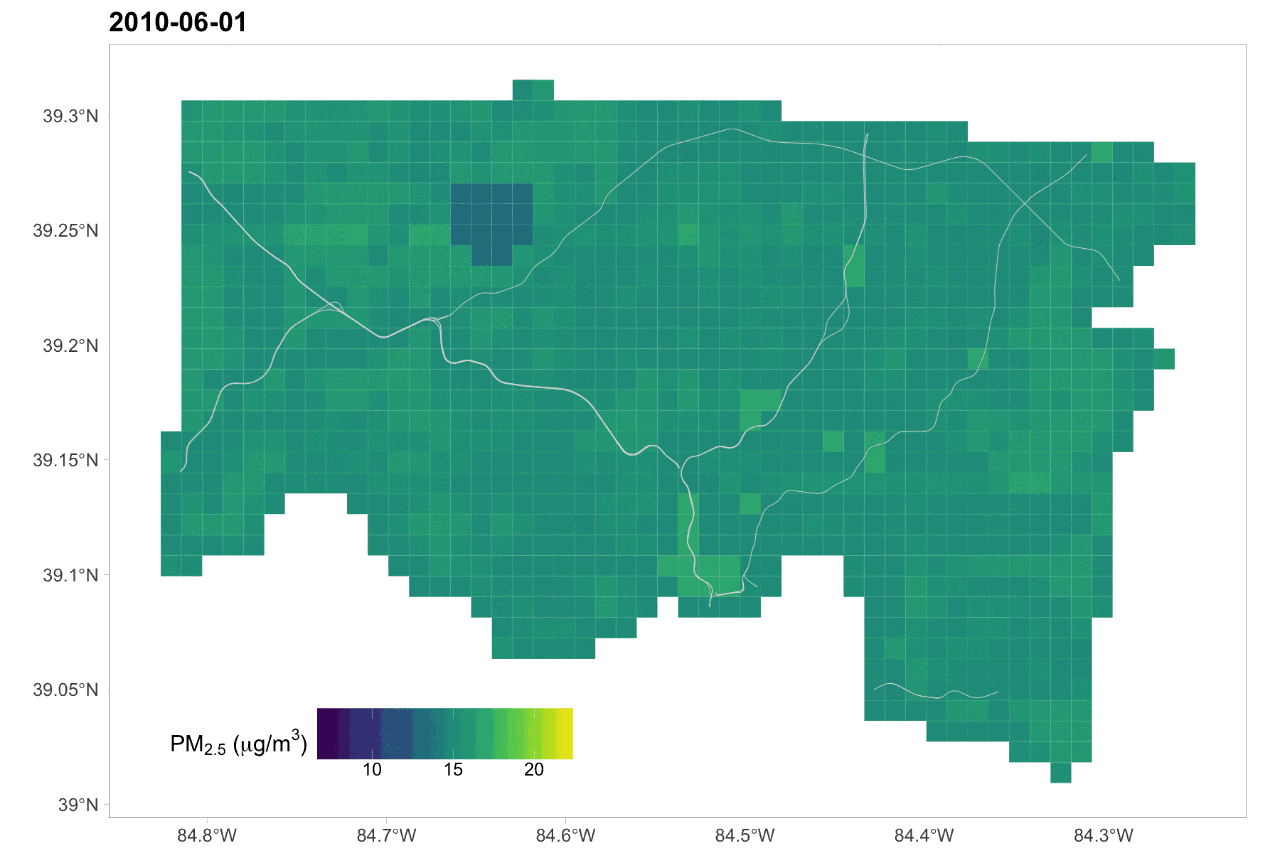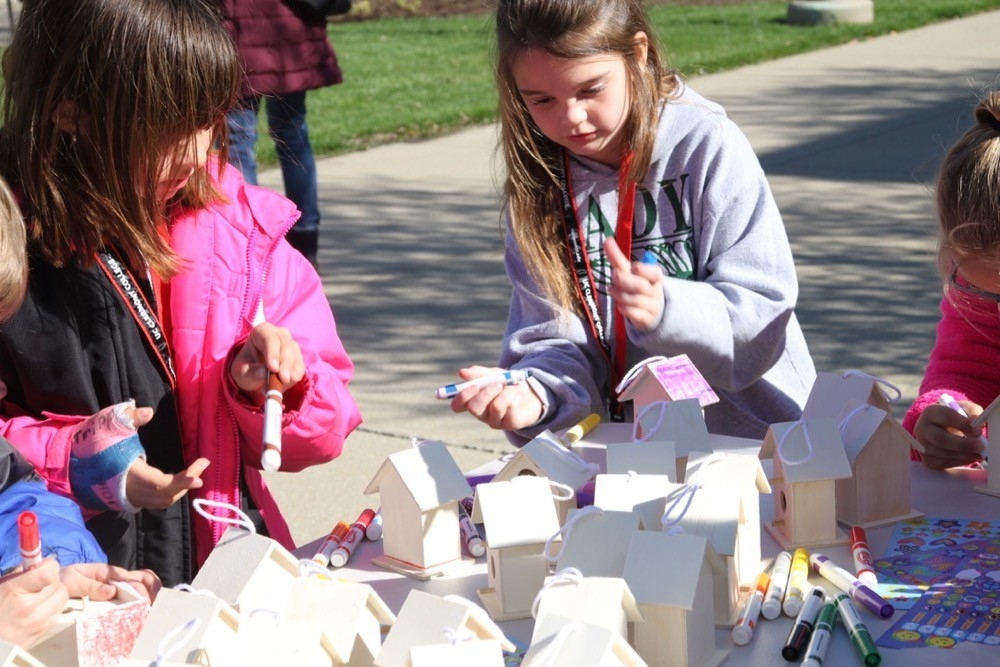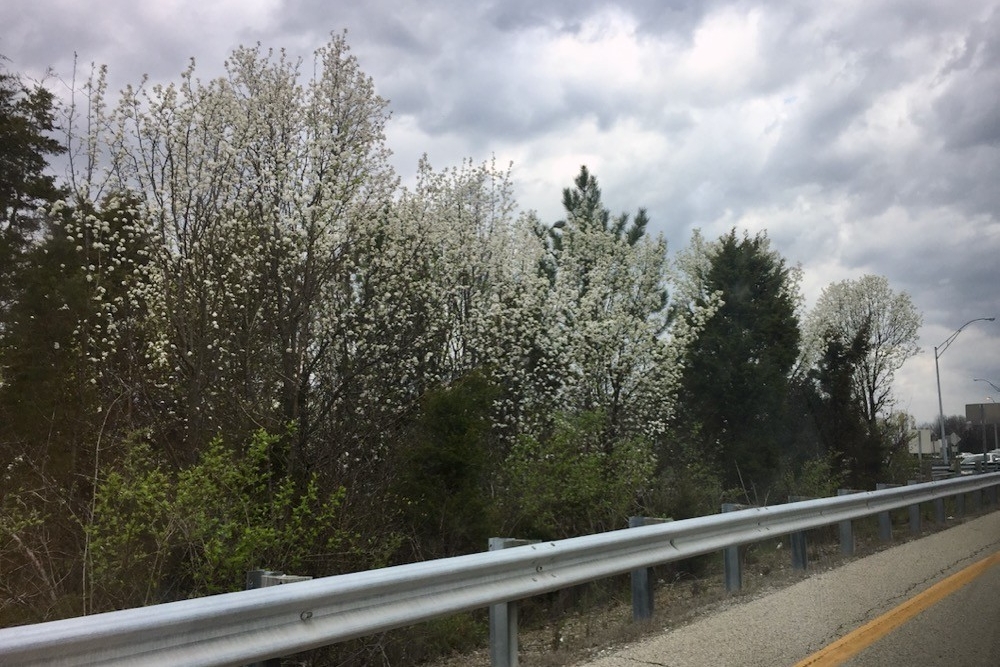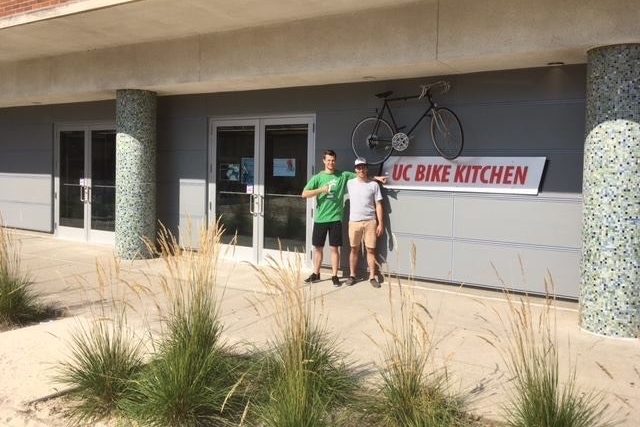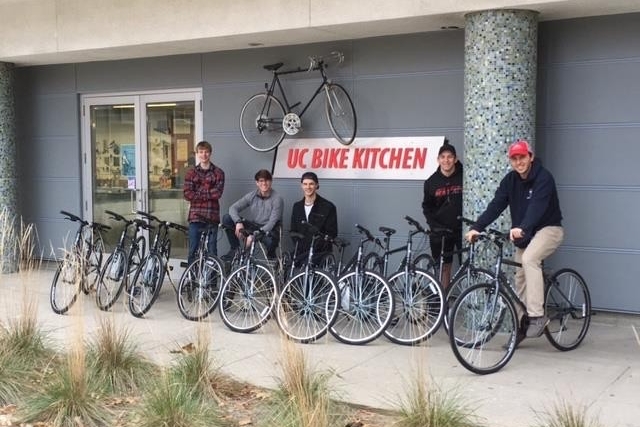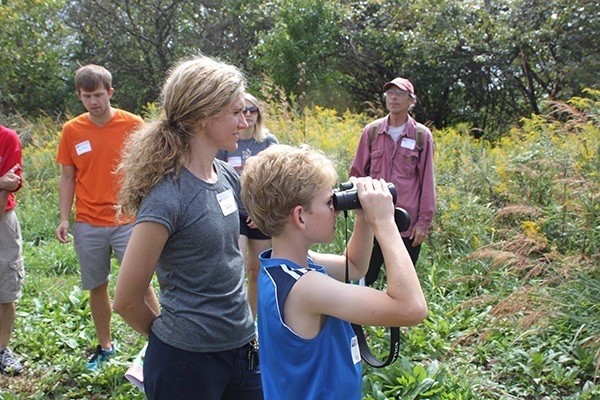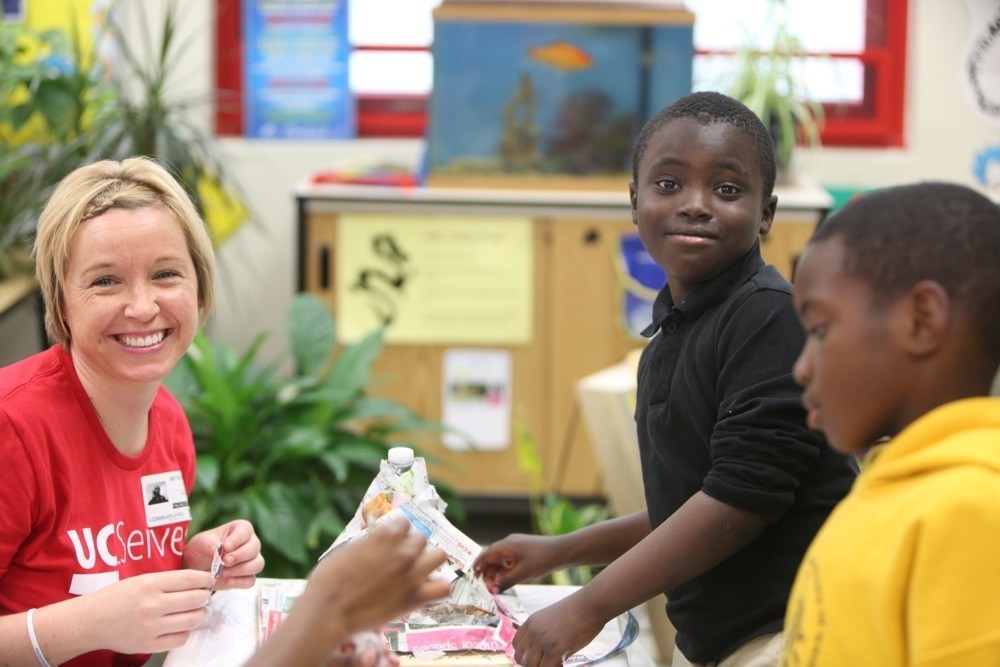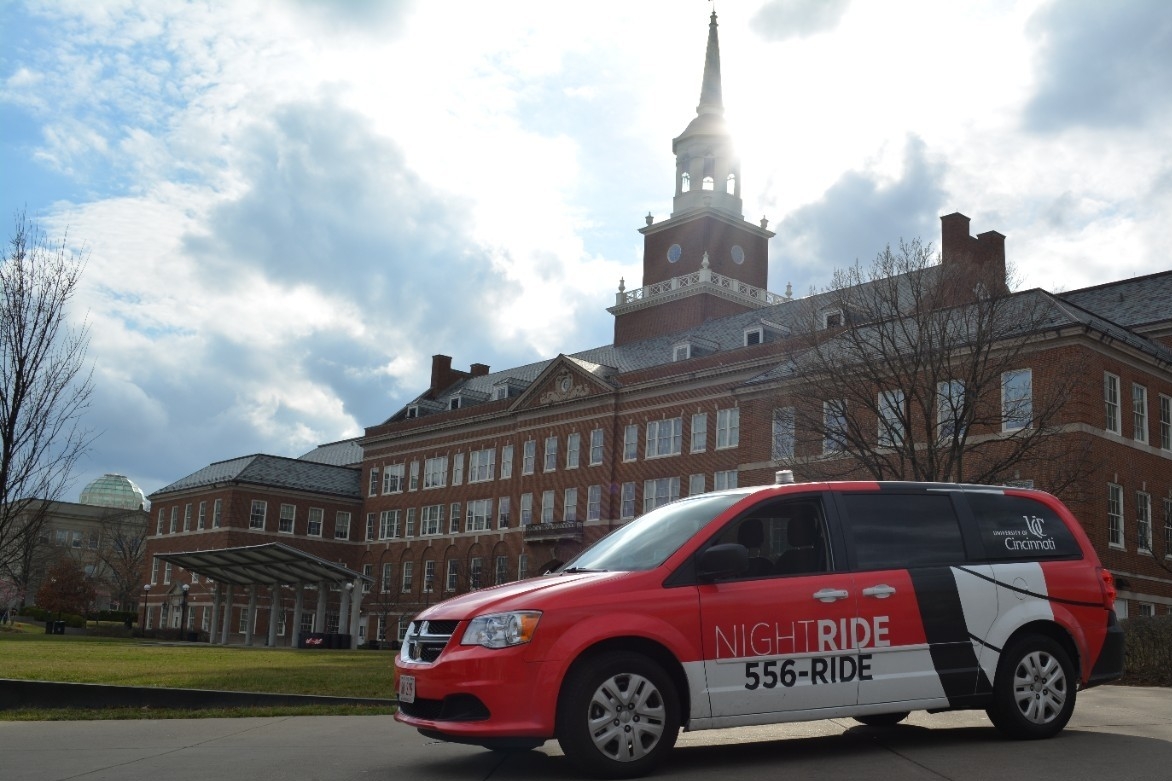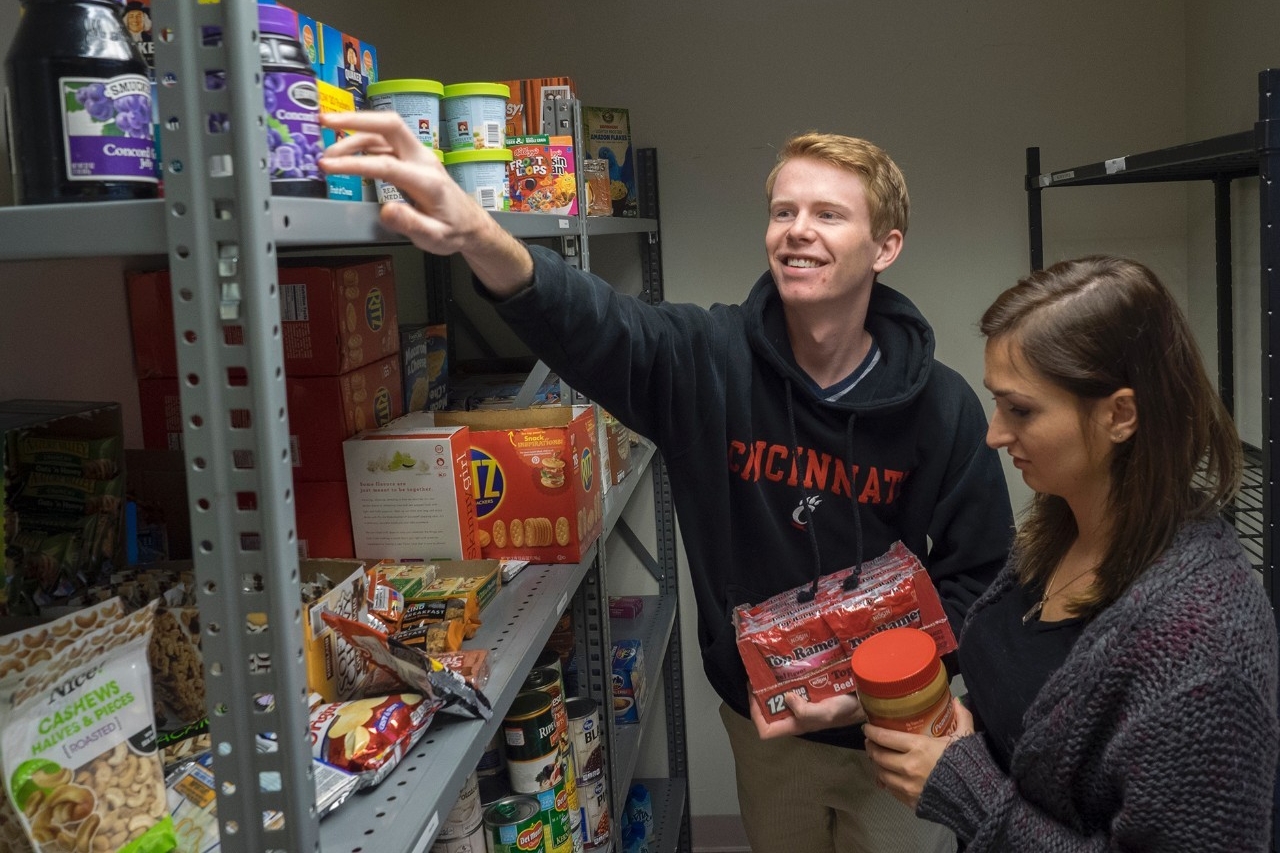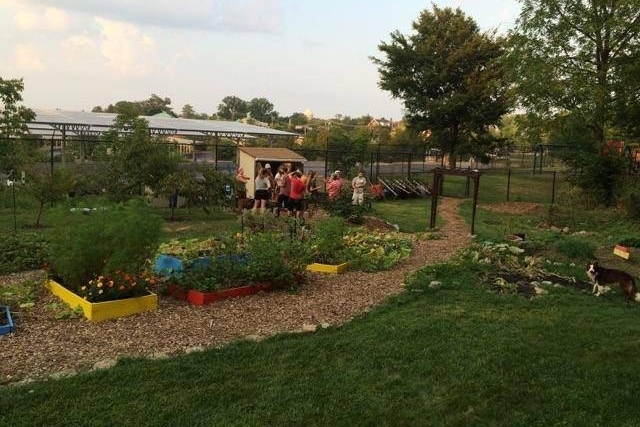UC students take advantage of award-winning campus green space on international Earth Day and all year long. photo/Colleen Kelly/UC Creative Services
Latest Magazine
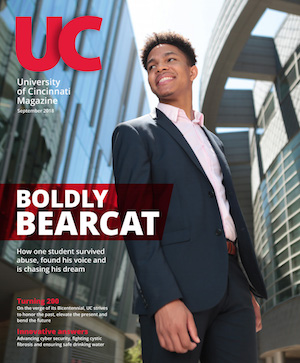 September 2018
September 2018
Boldly Bearcat
Finding his voice
Danger in the tap
Virtual defense
Global game changer
Celebrating UC's Bicentennial
 Past Issues
Past Issues
Browse our archive of UC Magazine past issues.
Going green earns campus 'gold'
UC’s Earth Day events highlight successful campus sustainability efforts that helped the university earn international ‘gold’ certification for the first time.
By Melanie Schefft
513-556-5213
Photos: provided
April 20, 2018
As Earth Day nears on April 22, the University of Cincinnati hosts events across campus, celebrating the earth and UC’s renewed commitment to building a safer, healthier and cleaner world.
The list of upcoming events highlight UC’s ongoing efforts to conserve energy while building award-winning Leadership in Energy and Environmental Design (LEED) certified buildings. The university also celebrates its first campuswide “gold” ranking from the Association for the Advancement of Sustainability in Higher Education (AASHE) –– a prestigious rating, says Daniel Hart, sustainability coordinator in UC's Department of Planning + Design + Construction.
“In addition to having a gold-rated campus from AASHE and working to renovate buildings to LEED standards, we are looking at ways to make our campus more of a living laboratory for sustainability by making our built environment as sustainable, efficient and ecologically conscious as possible,” he adds.
Hart credits the gold campus rating to UC’s various student sustainability organizations, academic classes flagged as having sustainable course competency, the number of LEED buildings on campus, and when it comes to water UC is presently tied with Stanford University for first place in the 2017 Sustainable Campus Index (SCI) for the efficient use of water.
A number of campus buildings and living spaces already possess LEED certification –– including the newest Marion Spencer residence hall that opened in March and the renovated Fifth Third Arena scheduled to open in the fall. But one new building will earn “gold” LEED certification for sustainability, helping to propel UC’s campus as one of the most ecologically conscious and energy efficient campuses in the nation.
The University of Cincinnati is anticipated to earn LEED gold on the newest Carl H. Lindner College of Business when it opens in 2019. This new structure includes sustainable wood products throughout and a lighting conservation system that adjusts to the amount of light outside the building using daylight harvesting sensors. “This new building will also possess an intensive green roof,” adds Hart.
Gold star campus
Waterfall along Campus Green on UC's award-winning main campus. Photo/Ashley Kempher/UC Creatives Services
Enduring innovation
Green roofs have multifunctional benefits, as Hart explains they reduce the amount of stormwater runoff and therefore lessen the probability of combined sewer/stormwater overflow events. They also reduce the urban heat island effect, or the absorption of heat by the concrete and buildings, saving heating and cooling energy costs and add to the aesthetic beauty of the buildings.
“A beautiful thing about sustainability is that it is so transdisciplinary and interdisciplinary,” Hart says. “It requires knowledge from ecology, biology, geography, planning, history, business and sociology and in the way that you and I relate to each other.”
Examples of UC’s ongoing sustainability success:
- UC facilities management maintains a 40-percent reduction in greenhouse gas emissions from the plant on main campus resulting in more than $600,000 in rebates from Duke Energy over the last two years.
- More than 14 tons of used campus coffee grounds were aged and composted to be turned into landscape fertilizer.
This year also marks the first monthlong UC Residence Hall Conservation Challenge sponsored by UC's Sustainability and Facilities Management departments.
“Eight campus dorms are competing in March and April to see who uses the least amount of energy by shutting off lights, turning thermostats down and being mindful of water usage,” says Mike Hofmann, director of Utilities. “We installed dashboard displays on monitors in residence hall lobbies that show the usage over time. Going forward we plan to have in place dashboards displayed in all the residence halls so students can continually observe how much energy the buildings use and can see the results of their efforts in real time.
“I also have a great appreciation for the excellent suggestions for potential energy saving ideas from the students,” adds Hofmann. “They are our biggest resource and show a real vested interest.”
The system measured the conservation of electric, steam and chilled water usage in each dorm. Results were normalized across all dorms large and small by dividing the data into BTU’s per person and posted daily to watch the comparison.
Innovation inside and out
Other new LEED certified architecture initiatives include UC’s 1819 Innovation Hub, which includes a high-efficiency gas boiler, occupancy sensors, bioswales to remove silt and pollution from stormwater runoff adjacent to the parking areas, stormwater retention tanks and low maintenance, long life-cycle materials.
More info on UC’s LEED buildings
The award-winning sustainable structures not only beautify UC’s campus but are home to cutting-edge research and classes taught by faculty change agents in the world of climate change and environmental issues.
For example students can now use an interactive map that shows how the global climate will change by 2070 created by Tomasz Stepinski, UC geography professor, or learn the latest about the rise in climate-related health issues from Cole Brokamp, UC assistant professor and air pollution researcher, by using his interactive GIF technology developed to map daily levels of air pollution in Hamilton County, Ohio.
Theresa Culley, UC professor of biology and director of the new greenhouse currently under construction on top of Riveschl Hall, was recently appointed to a two-year term on the Ohio Department of Agriculture’s Invasive Plant Advisory Committee. She is the academic part of a 5-member team of Ohio environmental program representatives working on state legislation to list invasive plant species. In particular, species with negative impact on the natural environment like Callery Pear trees currently found along roadways in Ohio and other midwestern states.
"The new state regulation of invasive plant species is an important step to further reduce the negative impact that these plants have in our natural areas, such as in nearby Burnet Woods," says Culley.
Color-coded GIF of the month of June, 2010, portrays the daily level of air pollution in Hamilton County, Ohio. Each block = 1x1 kilometer and lighter shades of green depict higher levels of pollution on those days. GIF created by Cole Brokamp, UC assistant professor and air pollution researcher at CCHMC. To watch it in action click here
Students take charge
Earth Day events across all four campuses kicked off in early April beginning with the annual Clean-up Cincinnati student outreach. Panel experts from Environment Ohio and UC faculty later gathered in TUC for a discussion on local problems and solutions regarding climate change.
Upcoming events on main campus include an environmental wellness fair, UC’s fifth annual bike show and composting and tree planting workshops. Later in the month UC partners with the local community to set up Re*Use Market dates and locations designated for recycling clothing, furniture and appliances students no longer want as they move out of their residence halls for the summer.
UC Blue Ash students in Robert Gioielli’s environmental activism class showcased their work with a variety of local environmental organizations as part of their “Mediated Minds” undergraduate research conference. The projects allowed the students to connect theory to practice in understanding how the history of environmental activism and reform shapes contemporary efforts and institutions.
UC Clermont has been on the ecological forefront for the last decade with their Community Garden and annual Earth Day campus event. Located at the base of campus and maintained each year by UC Clermont’s biology and chemistry clubs, the garden donates more than six tons of fresh produce each year to local shelters, ministries and the YMCA.
Also in their 10th year, UC Clermont’s annual Earth Day festival involves inviting the entire class of more than 230 second graders from Batavia Elementary to campus for a day of painting birdhouses, chalk drawings, face painting, tours of the campus and an up-close view of a variety of birds by Raptors, Inc.
Organized each year by biology professors Christopher Green and Krista Clark the annual event gives future Bearcats a positive ecological experience, and all the kids go home with a goodie bag filled with frisbees and Earth Day educational books.
Second grade students from Batavia Elementary learn about local wildlife, decorate bird houses and spend the day learning positive ecological behaviors at UC Clermont's annual Earth Day festival.
Bikes on campus
UC’s Bike Kitchen, a shop for students to repair their bikes, has moved to its new location under Dabney Hall. Here students and staff can replace tires or tubes, adjust their derailleur and attend occasional workshops on bike repair and maintenance.
The Bike Share program recently increased its fleet of new bikes so students, staff and faculty can rent a bike with their Bearcat card to ride around campus for free for up to a week.
“With UC’s accessible Bike Kitchen and Bike Share system we provide people with an amazing hub for bike education, safety and accessibility,” says Hart. “It helps promote biking as a sustainable form of transportation that builds community and fosters healthy lifestyles.”
Bikes aren’t the only means of moving inside campus and around the community. In an effort to provide an ecology of different transportation choices –– outside the personal automobile –– UC Sustainability partners with programs such as Zipcar, a car rental system with cars located near Stratford Heights, McMicken Circle, Daniels Hall and on East Campus outside CARE/Crawley.
And for those who have their own car but want to save money on longer trips out of town, the university makes it possible to share rides with other folks through Zimride ride-share program.
“These are just a few of the programs that [teach] valuable skills and life experiences regarding sustainability. [Students] take the tools they learn here to go on and become proactive change makers and create a better world,” says Hart.
UC Sustainability has created a culture of sustainability by building awareness and encouraging sustainable behaviors that also support the university's new Strategic Direction.
More UC "green" programs:
UC Bike Kitchen — located under Dabney Hall at 101 W. Daniels St., is a free service to UC and the community where a trained mechanic will help you fix flat tires, brakes or gears. Hours fluctuate from semester to semester.
Bearcat Bike Share — located in the Bike Kitchen under Dabney Hall, students can go in and swipe their Bearcat card at the member service center and rent a bike for up to a week for free (including lock and chain).
Zimride –– a car-sharing system for faculty, staff and students to post an upcoming ride out-of-town for the weekend for others traveling on the same dates to split the cost of the rides.
Zipcar –– a car-rental system for a students, faculty and staff members to rent a car for a personal trip or for visitors who don’t have a car on campus. Read more
UC Center for Field Studies — Located in the Miami Whitewater Forest in Oxford, Ohio, on more than 4,400 acres of lakes, streams, and hiking trails, research and educational facilities at the station incorporate sustainable practices, including solar panels that actually send power back to the grid. Directions
UC Serves –– A community service initiative where UC faculty and staff volunteer at various sites around the Cincinati area to help clean up parks, work with elementary students and help build projects for those in need. The next UC Serves event will be on May 18, 2018. To register
UC NightRide — On-demand safe transportation for students, staff and faculty within one mile of UC’s main campus, everyday, 8 p.m. to 5 a.m.; Nov. 1 to March 11 , 6 p.m.-5 a.m.
UC Campus Services Food Pantry — The UC Bearcats Pantry provides free food, hygiene items, cleaning supplies and meal vouchers for campus dining halls to students with food and other insecurities.
UC Soiled Hands Learning Garden — An off-site garden on Ruther Avenue where students develop their interest in gardening, sustainable land use, and build community. Read more
Move-in/move-out recycling
Residential recycling events provide three separate initiatives to try to alleviate waste — diverting material from the landfill and encouraging students to donate materials.
- First initiative, campus donation bins, April 23-27 –– UC Housing and Office of Sustainability partner with St. Vincent de Paul to provide bins in the lobbies in every dormitory on campus for donating materials students leave behind.
- Second initiative, Re*Use exchange market, April 24-27 –– From 9 a.m.-6 p.m. each day at 270 Calhoun (grassy area east of the old University YMCA building). This drop-off and pickup “free market” helps students who live off campus donate unwanted goods and pick up other items they may want in exchange. At the end of the week all leftover items are donated to St. Vincent de Paul.
- Third initiative, city donation bins, July 26-Aug. 6 –– The Office of Sustainability and the City of Cincinnati partner to provide ways to recycle and donate materials in the neighborhoods at Bellevue Hills Park and at the Corryville Rec Center.
- Fifth Annual Bike Show –– (raindate from April 16 rescheduled for summer TBA), TUC
- UC Surplus Management Tour –– Friday, April 20, 3 p.m., 5121 Fishwick Drive
- “Before the Flood,” –– Friday, April 20, 1 p.m., film about climate change, UC Clermont, Snyder 142
- Tree Planting and Restoration w/Groundwork Cincinnati –– Saturday, April 21, 10 a.m.-1 p.m., tree planting along Cincinnati’s Mill Creek
- Re*Use Market, Three Initiatives –– April 24-Aug. 6, times/locations listed above
- UC Serves, all-day community service by UC staff –– Friday, May 18, registration required

